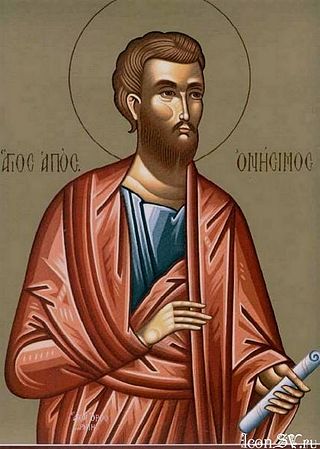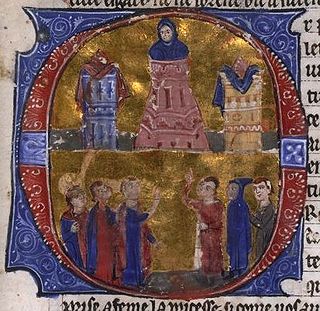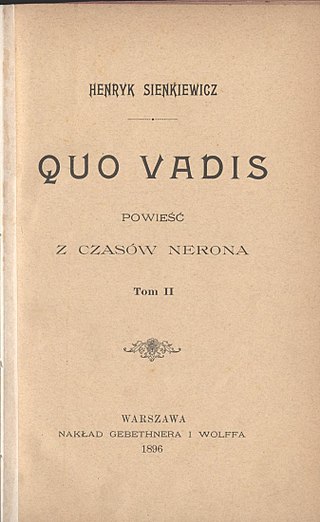
A Funny Thing Happened on the Way to the Forum is a musical with music and lyrics by Stephen Sondheim and book by Burt Shevelove and Larry Gelbart.

The Epistle to Philemon is one of the books of the Christian New Testament. It is a prison letter, authored by Paul the Apostle, to Philemon, a leader in the Colossian church. It deals with the themes of forgiveness and reconciliation. Paul does not identify himself as an apostle with authority, but as "a prisoner of Jesus Christ", calling Timothy "our brother", and addressing Philemon as "fellow labourer" and "brother". Onesimus, a slave that had departed from his master Philemon, was returning with this epistle wherein Paul asked Philemon to receive him as a "brother beloved".

Onesimus, also called Onesimus of Byzantium and The Holy Apostle Onesimus in the Eastern Orthodox Church, was probably a slave to Philemon of Colossae, a man of Christian faith. He may also be the same Onesimus named by Ignatius of Antioch as bishop in Ephesus which would put Onesimus's death closer to 95. If so, Onesimus went from slave to brother to bishop.

Raynald of Châtillon, also known as Reynald or Reginald, was a knight of French origin who became Prince of Antioch from 1153 to 1160 or 1161 and Lord of Oultrejordain from 1175 until his death. The second son of a French noble family, he joined the Second Crusade in 1147, and settled in the Kingdom of Jerusalem as a mercenary. Six years later, he married Constance, Princess of Antioch, in spite of her subjects' opposition.

Quo Vadis: A Narrative of the Time of Nero is a historical novel written by Henryk Sienkiewicz in Polish.

Julia Avita Mamaea or Julia Mamaea was a Christian Syrian noble woman and member of the Severan dynasty. She was the mother of Roman emperor Alexander Severus and remained one of his chief advisors throughout his reign. She was killed in 235 by rebel soldiers alongside her son.

Bohemond III of Antioch, also known as Bohemond the Child or the Stammerer, was Prince of Antioch from 1163 to 1201. He was the elder son of Constance of Antioch and her first husband, Raymond of Poitiers. Bohemond ascended to the throne after the Antiochene noblemen dethroned his mother with the assistance of the lord of Armenian Cilicia, Thoros II. He fell into captivity in the Battle of Harim in 1164, but the victorious Nur ad-Din, atabeg of Aleppo released him to avoid coming into conflict with the Byzantine Empire. Bohemond went to Constantinople to pay homage to Manuel I Komnenos, who persuaded him to install a Greek Orthodox patriarch in Antioch. The Latin patriarch of Antioch, Aimery of Limoges, placed Antioch under interdict. Bohemond restored Aimery only after the Greek patriarch died during an earthquake in 1170.
Gaius Avidius Cassius was a Syrian Roman general and usurper. He was born in Cyrrhus, and was the son of Gaius Avidius Heliodorus, who served as praefectus or governor of Roman Egypt, and Julia Cassia Alexandra, who was related to a number of royal figures, including her descent from both Augustus and Herod the Great. He began his military career under Antoninus Pius, rising to the status of legatus legionis. He served during the Parthian war of Lucius Verus, in which he distinguished himself, for which he was elevated to the Senate, and later made Imperial legate. During the Bucolic War, he was given the extraordinary title of Rector Orientis, giving him Imperium over all of the eastern provinces of the Roman Empire.

Annia Aurelia Galeria Lucilla or Lucilla was the second daughter of Roman Emperor Marcus Aurelius and Roman Empress Faustina the Younger. She was the wife of her father's co-ruler and adoptive brother Lucius Verus and an elder sister to later Emperor Commodus. Commodus ordered Lucilla's execution after a failed assassination and coup attempt when she was about 33 years old.

The Medieval history of Cyprus starts with the division of the Roman Empire into an Eastern and Western half.
Placidia was a daughter of Valentinian III, Roman emperor of the West from 425 to 455, and from 454/455 the wife of Olybrius, who became western Roman emperor in 472. She was one of the last imperial spouses in the Roman west, during the Fall of the Western Roman Empire during Late Antiquity.

Licinia Eudoxia was a Roman Empress, daughter of Eastern Roman Emperor Theodosius II. Her husbands included the Western Roman Emperors Valentinian III and Petronius Maximus.

Septimius Vaballathus was emperor of the Palmyrene Empire centred at Palmyra in the region of Syria. He came to power as a child under his regent mother Zenobia, who led a revolt against the Roman Empire and formed the independent Palmyrene Empire.

The Battle of Antioch was fought between the Roman army of the Emperor Macrinus and his rival Elagabalus, whose troops were commanded by General Gannys, probably a short distance from Antioch. Gannys' victory over Macrinus led to the downfall of the emperor and his replacement by Elagabalus.
Chousei Kantai Sazer-X translated as Super Star Fleet Sazer-X is a tokusatsu superhero TV series produced by Toho Company Ltd., and Konami. This series is the third in Toho's Seishin series. The series lasted 38 episodes and was the last of the Chouseishin franchise. It deviates from its predecessors in several ways, in that it is more comedic in nature and is much more science fiction-orientated in contrast to fantasy.
Ring is a series of horror novels written by Koji Suzuki. The novels were initially a trilogy, consisting of Ring, Spiral, and Loop. A short story collection called Birthday was released shortly after, introducing extra stories interconnecting the trilogy. Two further books, S and Tide, were published in 2012 and 2013, respectively.
The Videssos cycle is a fantasy novel series by Harry Turtledove and set in the Videssos fictional universe. Turtledove uses his knowledge of Byzantine Empire history and military experience extensively within the story.

Kiki is a 1926 American silent romantic comedy film directed by Clarence Brown and starring Norma Talmadge and Ronald Colman. The film is based upon a 1918 play of the same name by André Picard, which was later adapted by David Belasco and performed on Broadway to great success in 1921 by his muse Lenore Ulric.

Judah Ben-Hur, shortened to Ben-Hur, is a fictional character, the title character and protagonist from Lew Wallace's 1880 novel Ben-Hur: A Tale of the Christ. The book covers the character's adventures and struggle against the Roman Empire as he tries to restore honor to his family's name after being falsely accused of attacking the Roman governor. Judah encounters Jesus Christ and becomes a Christian.













